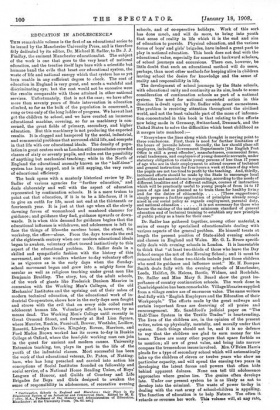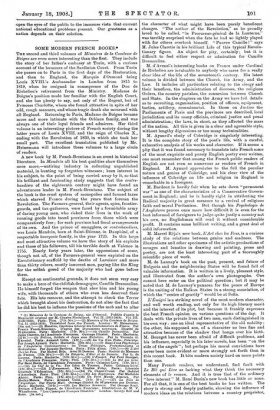EDUCATION IN ADOLESCENCE.* TPITS remarkable volume is the first of
an educational series to be issued by the Manchester University Press, and is therefore fitly dedicated by its editor, Dr. Michael E. Sadler, to Dr. J. J. Findlay, the eminent Manchester educationalist. The subject of the work is one that goes to the very heart of national education, and the treatise itself lays bare with a scientific but humane hand the evils that beset our educational system, the waste of life and national energy which that system has as yet been unable in any sufficient degree to check. The cost of education in England is very great, and needs a watchful and discriminating eye; but the cost would not be excessive were the results comparable with those attained in other national services. Unfortunately, that is not the case; we have after more than seventy years of State intervention in education climbed, so far as the bulk of the population is concerned, a rung or two only of the long ladder of progress. We have at last got the children to school, and we have created an immense educational machine, covering, so far as machinery is con- cerned, the great fields of primary, secondary, and higher education. But this machinery is not producing the expected results. It is clogged and hampered by the social, industrial, and commercial problems that surround child life, and compete in that life with our educational ideals. The density of popu- lation in great centres such as London still necessitates crowded classes of sixty or seventy pupils, and rules out the possibility of anything but mechanical teaching; while in the North of England the educational anomaly known as the "half-time" system has long sapped, and is still sapping, the very roots of educational efficiency.
The book opens with a masterly historical review by Dr. Sadler of various agencies for "further education," and deals elaborately and well with the aspect of education represented by continuation schools. It is a mere truism to point out that education, if it is to be a life-force, if it is to give an outfit for life, must not end at the thirteenth or fourteenth year. It is just at that age when all the slowly dawning forces of womanhood and manhood clamour for guidance ; and guidance they find, guidance upwards or down- wards. It is when this demand for guidance begins that the educational influence is withdrawn, and adolescence is left to face the things of life—the careless home, the street, the workshop, the office—alone. From the, days towards the end of the eighteenth century when our modern educational ideals began to awaken, voluntary effort turned instinctively to this aspect of the educational problem. Dr. Sadler deals in a skilled and sympathetic fashion with the history of this movement, and one wonders whether to-day voluntary effort is as vigorous as in the early days when the Sunday- school movement began and grew into a mighty force for secular as well as religious teaching under great men like Benjamin Braidley. The story, too, of the adult schools, of the work of giants like Frederick Denison Maurice in connexion with the Working Men's Colleges, of the old Mechanics' Institutes and the uprising out of their ashes of modern technical education, of the educational work of in- dustrial Co-operators, shows how in the early days men fought and strove with the evil that on every side coiled round adolescent human life. Voluntary effort is, however, by no means dead. The Working Men's College until recently in Great Ormond Street, and formerly at Red Lion Square, where Maurice, Ruskin, Furnivall, Brewer, Westlake, Ludlow, Rossetti, Llewelyn Davies, Kingsley, Bowen, Harrison, and Ford Madox Brown worked has its crown to-day in Ruskin
College at Oxford, where the bon-fide working man can join in the quest for ancient and modern causes. University Extension teaching, too, plays its part in the life of the youth,0
f the industrial classes. Most successful has been the work of that educational veteran, Dr. Paton, of Notting- ham, who has long• preached and carried into action his conceptions of Social Institutes founded on fellowship and social service, of a National Home Reading Union, of Boys' League's of Honour, and Guilds of Courtesy and Life Brigades for Boys and Girls designed to awaken the sense of responsibility in adolescence, of recreative evening
• Continuation Schools in England and Elsewhere their Place in the Educational System of an Industrial and Commercial State. Edited by X. E. I idler, M.A., Professor of the History and Administration of Education. ),tanchester: at the University Press. [8s. 65. net.]
schools, and of co-operative holidays. Work of this sort has done much, and will do more, to bring into youth that sense of reality in life which it is the end and aim of education to provide. Physical education, and the various forms of boys' and girls' brigades, have indeed a great part to play in national education. This book does not deal with the educational value, especially for somewhat backward scholars,
of school journeys and excursions. There can, however, be little doubt that such an educational method will do more,
perhaps, than most other methods for keeping alive in children leaving school the desire for knowledge and the sense of reality and responsibility in life.
The development of school journeys by the State schools, with educational unity and continuity as its aim, leads to some consideration of continuation schools as part of a national system. The need for national concerted action in this direction is dwelt upon by Dr. Sadler with great earnestness. The problem is receiving attention throughout the civilised world, and not the least valuable part of the mass of informa- tion conceutrated in this book is that relating to the efforts now being made in Germany, Switzerland, Denmark, and the United States to solve the difficulties which beset childhood as it merges into manhood:—
"Everywhere the lines along which thought is moving point to three conclusions. First, there is need for further limitation of the hours of juvenile labour. Secondly, the law should place all employers, including Government Departments [the English Post Office is still a great offender], manufacturers, commercial firms, retail tradesmen, and employers of young domestic servants, under statutory obligation to enable young persons of less than 17 years of age who are in their employment to attend courses of technical and general instruction for four hours a week at times of day when the pupils are not too tired to profit by the teaching. And, thirdly, increased efforts should be made by the State to encourage local authorities and associations in organising, according to the needs of different localities and of different callings, courses of instruction which will be practically useful to young people of from 14 to 17 years of age and so planned as to train them for healthy living
and for the duties of citizenship [These suggestions] simply propose a further application of principles already recog- nised in our social policy as regards employment, parental duty, and national education it is not necessary for those who favour the raising of the national minimum standard of general education and of technical training to establish any new principle of public policy as a basis for their case."
Dr. Sadler has gathered together, among other material, a series of essays by specialised educationalists dealing with various aspects of the general problem. He himself treats at
length the present position of State-aided evening schools and classes in England and Wales. Mr. G. L. Bruce specifi- cally deals with evening schools in London. It is lamentable to think that "at least two-thirds of those who leave the Day School escape the net of the Evening School ; and it must be remembered that those two-thirds include just those children who need its guidance and influence most." Mr. H. Bompas Smith deals fully with the evening schools of Manchester, Leeds, Halifax, St. Helens, Bootle, Widnes, and Rochdale. Dr. Sadler and Miss Mary S. Beard show the great im- pdtance of country continuation schools. The work done in Cambridgeshire has been remarkable. Village libraries supplied from a village centre are of enormous value. The same writers deal fully with "English Employers and the Education of their Workpeople." The efforts made by the great railways and certain important firms are deserving of all praise and encouragement. Mr. Sandiford's judicial paper on "The Half-Time System in the Textile Trades" is heartrending.
The lives of the children are, in the opinion of the present writer, eaten up physically, mentally, and morally under that system. Such things should not be, and it is no defence
to say that the children are glad to earn money for the home. There are many other papers that space forbids us to mention; all are of great value, and bring into narrow compass the tremendous issues involved. Mrs. O'Brien Harris pleads for a type of secondary school which will automatically take up the children of eleven or twelve years who show no particular capacity, and will spend the ensuing two years in developing the latent forces and powers that often hide
behind apparent dulness. None can tell till adolescence approaches where genius lies. The genius often develops late. Under our present system he is as likely as not to develop into the criminal. The waste of power to-day in dealing with the vast army of school-children is appalling. The function of education is to help Nature. Too often it retards or reverses her work. This volume will, at any rate,
.open the eyes of the public to the immense vista that current national educational problems present Our greatness as a nation, depends on their solution.







































 Previous page
Previous page